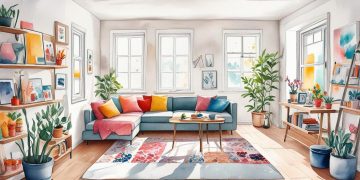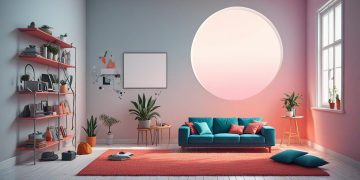
Minimalism and the Reduction of Storage Space: How to Simplify Life with Fewer Items
Minimalism promotes a simpler lifestyle by reducing storage space and possessions, enhancing mental clarity and emotional well-being. Embracing fewer items fosters organization, financial savings, and meaningful experiences, allowing individuals to reclaim focus and prioritize what truly matters in life amid consumer culture.

The Art of Maximizing Small Spaces: Minimalist Strategies to Organize Your Home
Discover how to transform small spaces into harmonious environments through minimalist strategies. Embrace multifunctional furniture, clever storage solutions, and intentional design choices to create a serene atmosphere. Regular decluttering and the one-in, one-out rule foster organization and enhance your lifestyle, maximizing space while reflecting personal style.

Minimalist Lifestyles: Organizing Space in Shared Communities
The article explores how minimalist lifestyles enhance organization and well-being in shared communities. By prioritizing simplicity, intentional living, and effective space utilization, residents foster collaboration and social harmony. Emphasizing decluttering and shared resources, minimalism promotes a sustainable, peaceful environment that nurtures connections among individuals in communal living arrangements.

The Importance of Multifunctional Furniture: How to Choose Pieces that Maximize Space in Small Environments
As urban living spaces shrink, multifunctional furniture becomes essential for maximizing space in small environments. By selecting versatile pieces that combine practicality and style, residents can create organized, efficient homes. Emphasizing adaptability, storage solutions, and design cohesion leads to a harmonious balance of functionality and aesthetics.

Creating Minimalist Workspaces: The Importance of Physical Organization in Enhancing Creativity
Creating a minimalist workspace is vital for enhancing creativity and productivity. By prioritizing physical organization and decluttering, individuals can cultivate a focused environment that sparks innovation. This intentional design not only reduces distractions but also promotes mental clarity, ultimately fostering a culture of creativity and effective workflow.

Mindful Living and the Aesthetics of Space: Creating Environments that Reflect Our True Priorities
In today's fast-paced world, mindful living emphasizes creating spaces that resonate with our true priorities. Thoughtfully designed environments enhance mental well-being, boost productivity, and foster deeper connections. By integrating aesthetics, natural elements, and intentional decor, we cultivate meaningful places that reflect our values and promote tranquility.

Digital Minimalism: How to Use Virtual Space Efficiently
In a world filled with digital distractions, adopting digital minimalism is essential for reclaiming control over your virtual space. By evaluating online habits, curating meaningful content, and practicing mindful technology use, individuals can enhance productivity, reduce stress, and foster a more intentional digital existence.

Minimalism and the Importance of Emotional Space: How to Organize the Interior for a Lighter Lifestyle
Explore how minimalism enhances emotional space and well-being by creating organized environments that reduce stress and promote clarity. Simplifying your surroundings allows for greater focus and emotional stability. Learn actionable steps to design interiors that nurture mindfulness and intentional living for a lighter, more fulfilling lifestyle.

Detachment Strategies: Transforming Objects into Free Space and Opportunities for Creativity
Explore how detachment strategies can unlock creativity by freeing physical and mental spaces. By decluttering, practicing mindful consumption, and embracing emotional detachment, individuals can enhance focus and innovation. Discover techniques for transforming objects into opportunities for artistic expression and cultivating a more intentional, creativity-driven lifestyle.

Mindful Living and the Redefinition of Success: Less Possessions, More Meaning
The article explores how mindful living shifts the definition of success from material wealth to meaningful experiences and deep connections. It emphasizes the importance of community, simplicity, and mental well-being, highlighting how less possession can lead to greater fulfillment and a more intentional, purpose-driven life.